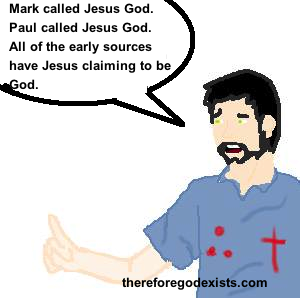 Christians who indulge in liberal scholarship will hear the testimony that the synoptic gospels (Matthew, Mark, and Luke) are somewhat reliable, while the Gospel of John is not reliable as a historical document. It will be testified that the Gospel of John contains embellished and later details of the Lord Jesus, or that it was written too late to be reliable, or that it was not written by eye-witnesses. The Gospel of John was a theological narrative, of theological reflection, not a historical narrative (so the argument goes). In this way, the author could put words into the mouth of Jesus at will, not because they are what he said, but because it is what the author believed Jesus said. Where does that leave our Bible? Is the Gospel of John reliable? Is it God’s word?
Christians who indulge in liberal scholarship will hear the testimony that the synoptic gospels (Matthew, Mark, and Luke) are somewhat reliable, while the Gospel of John is not reliable as a historical document. It will be testified that the Gospel of John contains embellished and later details of the Lord Jesus, or that it was written too late to be reliable, or that it was not written by eye-witnesses. The Gospel of John was a theological narrative, of theological reflection, not a historical narrative (so the argument goes). In this way, the author could put words into the mouth of Jesus at will, not because they are what he said, but because it is what the author believed Jesus said. Where does that leave our Bible? Is the Gospel of John reliable? Is it God’s word?
 Since the Gospel of John so powerfully attests to the deity of Christ, any Christological system which seeks to undermine that reality, will have to contend with the Gospel of John. So they will attack the credibility of the gospel, as the opening words speak volumes. “In the beginning was the Word, and the Word was with God, and the Word was God.” Anyone who denies that Jesus claimed to be God will have to either severely compromise this text or deny the authenticity altogether. However, I would like to suggest that the debate about the deity of Christ must be held on exegetical grounds, as the Gospel of John seems to have the tracings of historical reliability.
Since the Gospel of John so powerfully attests to the deity of Christ, any Christological system which seeks to undermine that reality, will have to contend with the Gospel of John. So they will attack the credibility of the gospel, as the opening words speak volumes. “In the beginning was the Word, and the Word was with God, and the Word was God.” Anyone who denies that Jesus claimed to be God will have to either severely compromise this text or deny the authenticity altogether. However, I would like to suggest that the debate about the deity of Christ must be held on exegetical grounds, as the Gospel of John seems to have the tracings of historical reliability.
 Is the Gospel of John objective? When I ask this question, I am speaking about the bias that the author brings to the text. Is he writing with utter disinterest, or does he have an opinion about the matter in question, and do those opinions shine through? Well, I suppose that would raise a few other questions. I would scarcely expect to find a historical document wherein the author did not care about the subject of which they are writing. If they did not care about the subject, then I would have to wonder why they were writing about it in the first place. Of course John cared about what he was writing, and of course he had his view of Jesus. But that is not to say that his views compromised his integrity. I would extend that further and say that precisely because John cared about the words of Jesus, that made his testimony more reliable because he wanted to accurately represent the Lord.
Is the Gospel of John objective? When I ask this question, I am speaking about the bias that the author brings to the text. Is he writing with utter disinterest, or does he have an opinion about the matter in question, and do those opinions shine through? Well, I suppose that would raise a few other questions. I would scarcely expect to find a historical document wherein the author did not care about the subject of which they are writing. If they did not care about the subject, then I would have to wonder why they were writing about it in the first place. Of course John cared about what he was writing, and of course he had his view of Jesus. But that is not to say that his views compromised his integrity. I would extend that further and say that precisely because John cared about the words of Jesus, that made his testimony more reliable because he wanted to accurately represent the Lord.
 All history has some sort of bias. Our records of the Civil War written by northmen who oppose slavery are not unreliable documents just because the author had an opinion or a bias. The bias must be taken into account, as with any historical document. Is the Gospel of John Reliable? I am not inclined to think that as a consequence of his bias, we can charge him with unreliability. I am keen to think just the opposite, that because of his bias in favor of documenting the words of Jesus with precision, he would be unlikely to load the mouth of Jesus with his theological biases. Further, it may be the case that his theological biases were directed by the words of Jesus rather than vice versa. I will look more closely at this soon.
All history has some sort of bias. Our records of the Civil War written by northmen who oppose slavery are not unreliable documents just because the author had an opinion or a bias. The bias must be taken into account, as with any historical document. Is the Gospel of John Reliable? I am not inclined to think that as a consequence of his bias, we can charge him with unreliability. I am keen to think just the opposite, that because of his bias in favor of documenting the words of Jesus with precision, he would be unlikely to load the mouth of Jesus with his theological biases. Further, it may be the case that his theological biases were directed by the words of Jesus rather than vice versa. I will look more closely at this soon.
 Why does the Gospel of John sound different from the other gospels? In the synoptics gospels, Jesus always has parables on his lips and offers very short and condensed speeches. But in the Gospel of John, he offers no parables and full speeches. Well, I have two thoughts about this. First, the Gospel of John has an outlined purpose. He writes, “These have been written so that you may believe that Jesus is the Christ, the Son of God; and that believing you may have life in His name.” (John 20:31). John’s gospel looks different from the others because he had a very precise purpose. The other gospels were just compiling sayings and actions of Jesus in the form of ancient biography. But John wanted his audience to believe that Jesus is the Messiah, and the Son of God, and have eternal life. So he selected the sayings of Jesus that were most appropriate to achieve that end.
Why does the Gospel of John sound different from the other gospels? In the synoptics gospels, Jesus always has parables on his lips and offers very short and condensed speeches. But in the Gospel of John, he offers no parables and full speeches. Well, I have two thoughts about this. First, the Gospel of John has an outlined purpose. He writes, “These have been written so that you may believe that Jesus is the Christ, the Son of God; and that believing you may have life in His name.” (John 20:31). John’s gospel looks different from the others because he had a very precise purpose. The other gospels were just compiling sayings and actions of Jesus in the form of ancient biography. But John wanted his audience to believe that Jesus is the Messiah, and the Son of God, and have eternal life. So he selected the sayings of Jesus that were most appropriate to achieve that end.
 Secondly, the synoptic gospels seemed to have some commonality among them probably because they used similar sources. That is not to say that there was dependence upon one another, nor that there was a Q document (an earliest source that we have lost which they all appealed to). It is just to suggest that the authors used the same collection of sources. John probably did not use these sources. Rather, as John 21:24 says, “This is the disciple who is testifying to these things and wrote these things, and we know that his testimony is true.” John wrote his gospel, basing his stories on his own experiences.
Secondly, the synoptic gospels seemed to have some commonality among them probably because they used similar sources. That is not to say that there was dependence upon one another, nor that there was a Q document (an earliest source that we have lost which they all appealed to). It is just to suggest that the authors used the same collection of sources. John probably did not use these sources. Rather, as John 21:24 says, “This is the disciple who is testifying to these things and wrote these things, and we know that his testimony is true.” John wrote his gospel, basing his stories on his own experiences.
 This is also why there are expansive speeches in the Gospel of John. The promise of the Holy Spirit, the High Priestly prayer, et cetera, appear only in the gospel of John. When the other gospels record these events, they give condensed version of the events and skip over these. John included them, creating for us a fuller picture of the voice of Jesus. Is the Gospel of John reliable? Since the gospel has fuller speeches, it gives us a more clear picture of who Jesus was and the way he spoke, than the other gospels. As Doctor Craig Blomberg pointed out, the longer speeches in John’s gospel seem to mirror the rabbinic form of preaching, which suggests that Jesus actually spoke that way. Jesus obviously did not go around reciting single proverbs and then walk off. The synoptics record fragments of longer speeches. In John, we see some of the full speeches.
This is also why there are expansive speeches in the Gospel of John. The promise of the Holy Spirit, the High Priestly prayer, et cetera, appear only in the gospel of John. When the other gospels record these events, they give condensed version of the events and skip over these. John included them, creating for us a fuller picture of the voice of Jesus. Is the Gospel of John reliable? Since the gospel has fuller speeches, it gives us a more clear picture of who Jesus was and the way he spoke, than the other gospels. As Doctor Craig Blomberg pointed out, the longer speeches in John’s gospel seem to mirror the rabbinic form of preaching, which suggests that Jesus actually spoke that way. Jesus obviously did not go around reciting single proverbs and then walk off. The synoptics record fragments of longer speeches. In John, we see some of the full speeches.
 Why is it dated so late? Most scholars (including conservative scholars) will date the Gospel of John to the late first century, and in some cases, even the mid-second century. However, Doctor Gregory Boyd has suggested that this may be outdated scholarship. The reason that people date it so late is that the literary style that is found in John’s gospel seems to be influenced by gnostic literature and culture. If the author of John was influenced by them (not in theology, but in literature and style of writing), then this would suggest that his letter was composed much later, perhaps even one hundred years after the events that it records.
Why is it dated so late? Most scholars (including conservative scholars) will date the Gospel of John to the late first century, and in some cases, even the mid-second century. However, Doctor Gregory Boyd has suggested that this may be outdated scholarship. The reason that people date it so late is that the literary style that is found in John’s gospel seems to be influenced by gnostic literature and culture. If the author of John was influenced by them (not in theology, but in literature and style of writing), then this would suggest that his letter was composed much later, perhaps even one hundred years after the events that it records.
But as I said, this seems to be outdated scholarship. The Dead Sea Scrolls had writings that adopted the literary style which we find in the Gospel of John. That would indicate that we do not necessarily need a late date to account for this literary style. Is the Gospel of John reliable? If we are going to suggest that the late date of John would render it unreliable (which would be an unthinkable approach to history as there are many documents that we deem reliable which come even hundreds of years later), then we are faced with the challenge that the Gospel of John might not be as late as we once thought.
Why is John’s voice exactly the same as Jesus’s voice? Sometimes it is difficult for us to know exactly where Jesus stops and John begins. In John 3:16, was it Jesus or John who uttered the phrase, “For God so loved the world that he gave his only begotten Son, that those who believe in him shall never perish but have eternal life.”? Who said it? The voice of the narrator seems to be identical to the voice of the character. We do not know who is speaking. Some have suggested that this is suggestive of a manufactured Jesus. John was clearly putting his words into Jesus’s mouth.
However, I would like to suggest that a paraphrase is not a manufactured statement. In John 3:5, Jesus said, “Truly, truly, I say to you, unless one is born of water and the Spirit he cannot enter into the kingdom of God.” That is the NASB. The NLT says, “I assure you, no one can enter the Kingdom of God without being born of water and the Spirit.” These are identical statements insofar as content is concerned. But they are different insofar as his exact words are concerned. In the same way, John could have paraphrased Jesus, expressing exactly what Jesus meant, just in John’s words. Is the Gospel of John reliable? I think the voice of the narrator and the character gives us no reason for concern. John was simply paraphrasing.
John included statements that would have been embarrassing. Historians use a principle known as the criterion of embarrassment. If an author is manufacturing a story, it is unlikely that he would include a detail that was embarrassing to him, or in this case, to Jesus, unless they actually occurred. If he were in the business of embellishing details or stretching the truth, then he would simply remove the embarrassing details. Thus, if there are embarrassing details, we can suspect that the author is recording actual history. In the Gospel of John, there are statements that seem like they would have been difficult to accept or embarrassing.
There is a great emphasis in contemporary academic theology on the historical-grammatical method. We need to venture back to that time and understand what was going on. Well, the disciples were there. The disciples were literally in the historical-grammatical context. Yet they still did not understand. They are repeatedly told about the resurrection (John 2:18-22) and still doubted or did not understand. They behaved foolishly. But if they were embellishing the details, then surely, they would have excluded such details.
Further, Jesus is displayed very unfavorably, regarded by the crowd as something like an over-zealous street preacher. He held the very image that many of us fear so much when we come in public. As Doctor Frank Turek pointed out, his own brothers did not believe in him (John 7:5). He was called a deceiver (John 7:12). Many of his followers abandoned him (John 6:66). The Jews who believed in him decided to stone him (John 8:30-31, 59), and he is called a madman (John 10:20). If there are any categories that the contemporary Christian labors vigorously to avoid have applied to themselves, it is surely these. If they were inventing a story, they would not allow the public (his own followers and family!) to perceive Jesus in this way.
But even more critically is the center of the Christian faith. Jesus died on the cross. He absorbed the wrath of God. He paid the penalty that we deserve. We are sinners, and since God is just, he cannot let us go free. He would be a corrupt judge who pardons the guilty. But mercy upon mercy, God came as a man. The Son absorbed the penalty that we deserve. He paid our fine in full in his death on the cross, and then he rose from the dead. But that is not how the Jews perceived the crucifixion. The Jews saw a man under the curse of God, because anyone who hangs on a tree is under the curse of God, according to the Law (Deuteronomy 21:23). Hence, all false Messiahs were hanged on a tree. This exposed them as liars and blasphemers. If Jesus was the Messiah, then in the eyes of the first century Jew, he could not be hanged on a tree. But he was. The Jews did not understand that he became a curse for us, in our place (Galatians 3:13). They only saw a man under the curse of God. If a story was being invented, the crucifixion would have been excluded. Is the Gospel of John reliable? There are just too many details that the disciples would not have included if they were inventing a story.
There are no extravagant details in John’s gospel. Even the miracle stories are just a pale recounting of the events that happened. They are not dressed up. They just lay them out there. This is in contrast with the apocryphal Gospel of Peter, wherein we see large crowds of people coming to celebrate the resurrection. We see a large cross in the sky and we see heads of men stretching into heaven. If you are only concerned with telling theology, then why not offer a story like this? If John were not concerned with history, then he would have embellished the details.
His account of the empty tomb and the crucifixion is even more pale than Matthew’s account. Matthew tells us of the saints of old rising from the dead, coming out of their grave to mark the death of the Messiah. He tells us of a great earthquake, angels descending whose appearance was like lightning. John has angels in his account, but it is much less dramatic. It is more pale. It is unembellished by the extravagant details. Is the Gospel of John reliable? If he were making up a story, why not embellish the details? Why not compete with Matthew, or even the Gospel of Peter?
How did Jesus avoid being stoned? The skeptical New Testament scholar, Doctor Bart Ehrman points out that in the Gospel of John, Jesus publicly claimed to be God, and still continued in his public ministry. In John 8:58, he said, “Before Abraham was, I am.” Then he escaped before being stoned. But, Ehrman argues, how did he avoid being stoned? If Jesus claimed to be God, as the Gospel of John says, then he should have been stoned to death. Since he was not, and since he was able to maintain his public ministry, this suggests that he never claimed to be God.
However, I would like to suggest that Doctor Ehrman is begging the question. He has assumed his conclusion, and read it back into the history. He assumed that Jesus was not God. If Jesus was God, then the explanation that the Gospel of John gives is that he was always able to hide and escape, because it was not yet his time. God did not allow his Son to be executed until the proper time. Is the Gospel of John reliable? It is only unreliable if you assume that Jesus was not telling the truth.
But the problem becomes even greater when we realize that Jesus claimed to be God in all of the early Christian sources. He claimed to be God in the Gospel of Mark (as I argued in my article Is Jesus God In The Gospel of Mark?) Mark identifies him as God, the one for whom Elijah would prepare the way (Mark 1:2-3). He forgave sins (Mark 2:5). He is the bridegroom of Israel (Mark 2:19-20), and he called himself the Son of Man, who would receive dominion and power and worship over all the earth (Mark 14:62). Further, the letters of Paul establish that the early Christians thought that Jesus was God, as Paul himself directly identifies Jesus as God (Romans 9:5). He even cited a creed, that preceded him, which identified Jesus as God (Philippians 2:5-8).
This means that our earliest records indicate that Jesus claimed to be God. So, I would turn the question around on Doctor Ehrman. If Jesus was not God, how did he avoid being stoned?
If you would like to get in on the discussion about this, join my Theology Discussion Group!
